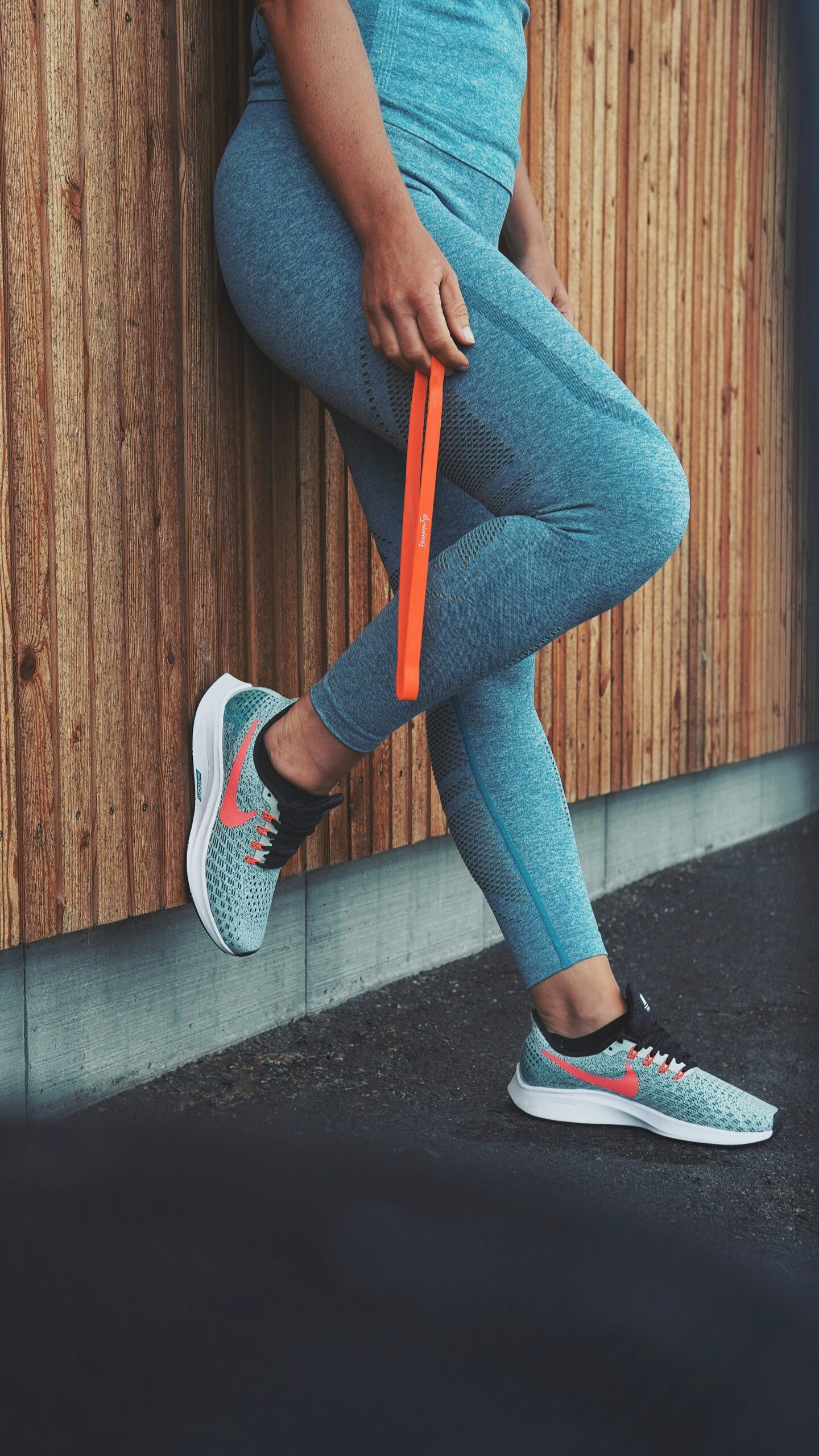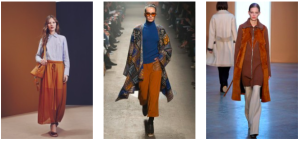I know, I know. You bought your lulu yoga pants in 2016 and you still wear them. Longevity is so often the justification for weaving polyester, aka plastic, into our workout clothes. And guess what, it gets me too because there’s plenty of it in my closet. I used to have a defeatist mindset about the risks of poly. The stuff is EVERYWHERE. So how are we supposed to avoid it?! (Then there’s the very practical matter: I really don’t love how a dank cotton shirt clings to me like someone who hasn’t read attachment-style literature during a three-hour tennis match.)
But alas, recent advancements in natural fiber technology and more conscious brand offerings mean we have more options on the table than the heyday of lulu. So going plastic and PFAS-free may still be a path of resistance, but it’s a little smoother these days.
This guide will make your transition like skating on freshly zambonied ice. (In your wool pants, of course). While you don’t need to go all in, transitioning towards plastic and PFAS-free workout clothes can help protect your health and the planet. Feel free to scroll right to the list, or do a deeper dive into why the use of plastics and PFAS is a pressing concern.
The Plastic Predicament in Workout Clothes
Synthetic fibers like polyester, nylon, and spandex, derived from plastic, are staples in workout clothes for their stretch and moisture-wicking properties. But, they come with a hidden cost. Each laundry cycle releases microplastics into water systems, contributing to the pollution of oceans and impacting marine life.
When it comes to your health, new research shows that we shouldn’t just avoid plastic in our diets, but on our skin. Chemical plastic additives, like bisphenols and phthalates, may leach out into sweat and become available for dermal absorption, according to Mohamed Abdallah, an associate professor in environmental science at the University of Birmingham. The environmental and health tolls of these materials necessitate a reevaluation of our clothing choices.
PFAS: Another Hidden Hazard
PFAS (per- and polyfluoroalkyl substances), known for their water and stain resistance, are embedded in various consumer products, including some workout gear (mostly synthetic). Dubbed ‘forever chemicals,’ PFAS persist in the environment and accumulate in the human body, posing risks such as hormonal disruption, immune system effects, and cancer risks. Sneaky hint: You might see it labeled as “Gore”Tex” technology by some brands.
Advantages of Choosing Plastic and PFAS-Free Options
TL:DR: Ditch plastics and PFAS for theses several reasons:
- Environmental Impact: Selecting natural, minimally processed, and biodegradable materials reduces pollution and conserves ecosystems.
- Health Considerations: Natural and low-chemical fibers offer breathability and are less likely to cause health risks (like endocrine disruption and cancer) and skin irritation.
- Ethical Consumption: There is often a correlation between companies focusing on eco-friendly materials and ones that adhere to ethical labor practices, promoting fair and sustainable production both nationally and internationally.
More Natural Brands to Consider
The market for plastic-free workout clothes is growing, with independent brands and bigger names like Patagonia leading the charge. Before you jump into the brand list one thing to know is that many of these brands still offer polyester in their lines, especially if it’s recycled or “rPET.” This option has a lower impact on the planet, helping divert some plastics from landfills, but it does not minimize the health or microplastic concerns and still perpetuates the systemic use of plastics. When possible, look for natural or semi-synthetics (like Tencel). Or at the bare minimum, look for blends with more than 50% natural materials.
Furthermore, this article is not meant to shame you out of your technical gear. Keeping what you have in cycle is a sustainable option. If you’re concerned about the health risks you can beging to gradually replacing items with sustainable alternatives as they wear out. You can also consider opting to replate the garments that directly tough your skin (undergarments, shirts, legging) before replacing outerwear.
15 Plastic and PFAS-Free Workout Brands
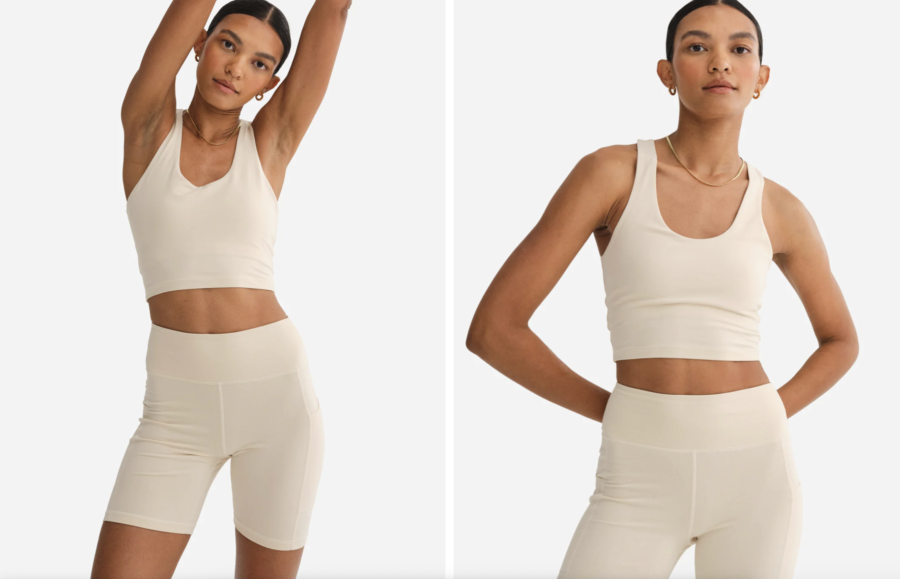
MATE the Label
Specializing in non-toxic and organic everyday wear, MATE’s MOVE collection features sports bras, biker shorts, and leggings in earth-inspired color mostly made from GOTS-certified cotton. Committed to ethical manufacturing in Los Angeles, they use organic materials and non-toxic dyes, plus offer a circularity initiative for recycling old pieces.
Icebreaker
Specializing in merino wool athletic wear, Icebreaker is a brand dedicated to providing high-performance, plastic-free options. Their products are designed with the natural breathability, odor resistance, and temperature regulation properties of wool, ideal for workout gear.
Happy Earth
Offers a collection of organic workout clothes made from 95% organic cotton and 5% elastane. These pieces are versatile, with some being reversible, and feature pockets for practicality. Produced in Fair Trade-certified factories in India using non-toxic dyes.
Iron Roots
A completely plastic-free brand that primarily uses TENCEL modal, lyocell, and some hemp and GOTS-certified organic cotton. Sourced mainly from FSC certified trees in Europe, their activewear is made with ethical practices in mind, focusing on a transparent and sustainable supply chain.
Reprise
Pioneering in sustainable activewear, Reprise uses plant-based materials like Tencel, focusing on plastic-free, skin-friendly fabrics. Their commitment to environmental stewardship is evident in their locally produced, comfortable, and durable leggings and bras, manufactured in New York City under strict sustainability standards.
PACT
Known for their use of GOTS-certified organic cotton and Fair Trade-certified factories, PACT offers a range of affordable and everyday casual and workout clothes for the whole family, from leggings and sports bras to athleisure wear in fun patterns and solid colors.
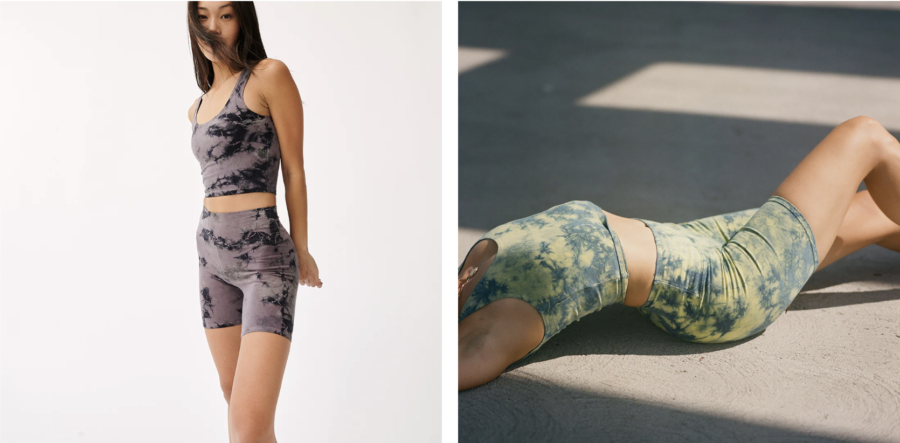
Groceries Apparel
Advocating for a plastic-free future, Groceries Apparel utilizes organic, recycled materials and natural dyes in their activewear. This Los Angeles-based brand merges sustainability with style, offering durable, eco-conscious options for the environmentally aware athlete.
Tripulse
Tripulse creates its entire range using TENCEL™ Lyocell, a semi-synthetic fabric made from eucalyptus fibers. Renowned for its eco-friendly and low chemical production, TENCEL™ is naturally high-performing, breathable, and incredibly gentle on the skin, offering a more sustainable and skin-friendly option. (I’m a big fan of their leggings!)
Arms of Andes
Specializes in 100% plastic-free activewear made from alpaca wool, sourced directly from herders in the Peruvian Andes. While pricey, their collection is great for outdoor workouts in colder weather, offering natural breathability, moisture-wicking, and temperature-regulation properties.
Janji
This European running brand uses natural materials like merino wool for moisture-wicking and temperature regulation. While it doesn’t use all-natural materials, it focuses on more eco-friendly and recycled options while supporting global water initiatives. Look for the merino wool blend hoodie.
Wool&
Focusing on the versatile and sustainable qualities of merino wool, Wool& offers a range of loungewear and undergarments that combine style, comfort, and performance. Their approach to slow fashion encourages the minimal and versatile use of each piece, reducing the need for frequent purchases.
Tentree
Known for its commitment to sustainability, Tentree crafts workout clothing from organic and natural materials, including hemp and Tencel, emphasizing comfort and eco-friendliness. There is some use of recycled poly in outerwear and technical materials.
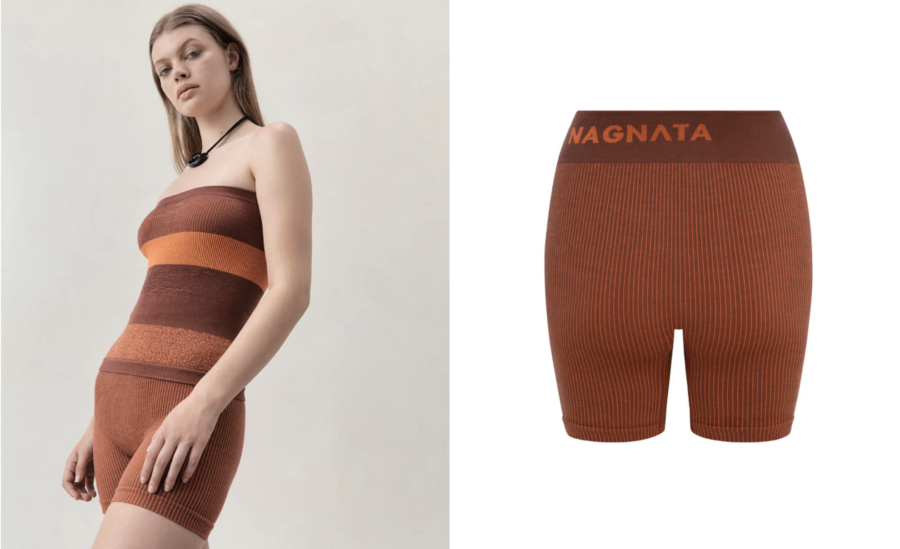
Nagnata
From Byron Bay, Nagnata merges high fashion luxury with workout clothing, focusing on sustainability through organic materials and seamless knitwear. Their approach emphasizes eco-friendliness and durability, offering stylish, versatile garments for the environmentally conscious.
Ryker Clothing Co
Tailored for men, Ryker Clothing Co offers gym wear crafted from 100% natural fibers, like cotton and merino wool, eschewing synthetic plastics. Their eco-friendly approach aims to reduce microplastics, promoting healthier, sustainable fitness apparel.
Patagonia
While known for its broad sustainability efforts, Patagonia offers a selection of workout and outdoor apparel made from organic cotton and responsibly sourced wool. Their dedication to ethical manufacturing and environmental activism makes them a leader in the sustainable fashion space.
Choosing brands like these for your workout wardrobe allows you to support sustainable practices and reduce your environmental footprint, all while enjoying high-quality, performance-oriented clothing.
Want to go plastic-free in other realms? Check out the guide to beauty products.
Images by brand. Featured image by unsplash.

